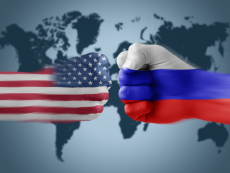
Email: ZYVC057@live.rhul.ac.uk
Total Article : 213
About Me:I'm a graduate student studying International Criminal Law and first started writing for King's News almost 4 years ago! My hobbies include reading, travelling and charity work. I cover many categories but my favourite articles to write are about mysteries of the ancient world, interesting places to visit, the Italian language and animals!

During the Potsdam meeting, one thing was made clear: everybody wanted Poland. The Soviet Union had a unique interest in gaining control over Poland as it had quickly learnt from World War Two that if a state wanted to attck Russia then their base would be in Poland. In the meantime, in the eyes of the Western world US President Woodrow Wilson's "fourteen point plan" was seen as the pinnacle of democracy. Indeed it set out to spread democratic tendencies throughout the world and called for each nation to decide its own form of government. In retrospect, it is clear to see that one man's empire is another man's democracy as Wilson hid his powerful plan to make America dominate world affairs under the apparently innocent viel of making the world a better place.
This is not the first time the US, like so many countries, has labelled its true militaristic intent nothing more than an honest fight for justice. Way back in 1823, the US formed the "big brother policy" known officially as the Monroe Pact. After Europeans had decolonised South America, the US assumed it was now its duty to protect their younger brother, South America, so it stipulated a pact to ensure that if a European nation were to try to colonise the South again it would be seen as an act of aggression. US President James Monroe therefore hid behind the rhetoric of justice and asserted the US as the Souths "big brother". Of course in reality a pact to keep Europeans away from the South only gave Northern America more power and freedom to exploit its younger brother.
Anyway, let's go back to 1945 to talk about what the Soviet Union thought of Wilson's Fourteen Points! Well, as expected, the Societ Union did not accept the principles laid out by Wilson and deemed them as too strict to abide by. Already in 1946, the US and Britain were strongly pushing for all of Germany to be united under Western control. Tensions grew higher than ever in Europe and, almost overnight, the continent had been divided as famously said in the words of Winston Churchill:
"From Stettin on the Baltic to Trieste on the Adriatic, an iron curtain has descended across the continent. Behind the line lie all the capitals of the ancient states of central and eastern Europe - Warsaw, Berlin, Prague, Vienne, Budapest, Belgrade, Bucharest and Sofia."
The Soviet Union bit back with avidity (e.g. enthusiam, the strong desire to push forward). It sought to form its own elite circle of alliances ny creating satellite states in 1946 and 1947. Slowly slowly, Bulgaria, Hungary, Poland and Romania established their very own communist governments. It is unsure whether Stalin did this to spread communism or simply to fortify his own grip on world affairs through that form of government. In 1948 there was a communist coup (a sudden seizure of power from a government) in Czechoslovakia which dismissed the democratic government; finally, the Soviet Union had a clear foothold in central Europe.
Image: http://www.thequotescupboard.com/wp-content/uploads/2015/01/cold-war-quotes.jpg

0 Comment:
Be the first one to comment on this article.